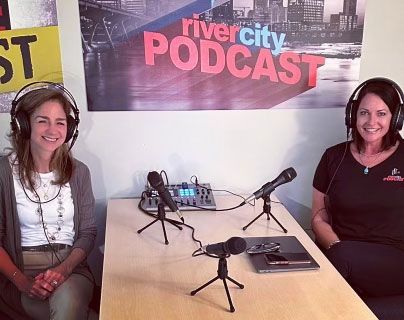Subtle Words That Undercut Your Professional Presence

The Tiny Words That Make a Big Difference in How You’re Heard
We’ve all been there—you’re in a meeting, giving a presentation, or leading a conversation, and suddenly a filler word sneaks in: “like,” “so,” “basically,” “right?” They might feel harmless, but in reality, they chip away at your message, making you sound less confident and less professional.
The kicker? Most of us don’t even realize we’re doing it. After hosting 100+ interviews on the River City Podcast, I’ve seen (and heard) just how common these slip-ups are—and why being intentional with your words makes all the difference. (Don’t worry, we edit them out for our podcast 😉)
1. “Like”
We know this one well. “Like” sneaks into our sentences as a filler or placeholder.
- Example:
“I was, like, talking to the client about the proposal.”
- Why it hurts you: Overusing
“like” can make you sound uncertain, scattered, or younger than you are. In professional settings, clarity and precision matter.
- Swap it out: Pause instead. Silence is more powerful than
“like.”
2. “Basically”
This word suggests you’re oversimplifying—or worse, that your audience might not understand without a “basic” explanation.
- Example:
“Basically, what we’re trying to say is…”
- Why it hurts you: It can come across as condescending or as though you’re downplaying the complexity of your point.
- Swap it out: Use
“In short,” or
“To summarize,”—these signal clarity without minimizing.
3. “So” (as a starter)
Beginning every sentence with “So” can weaken the strength of your message.
- Example:
“So, we need to increase sales by 20% this quarter.”
- Why it hurts you: It makes your statement sound like an afterthought rather than a confident directive.
- Swap it out: Just start with the core idea:
“We need to increase sales by 20% this quarter.” Stronger and sharper.
4. “Right?”
This tag question is meant to engage, but it often backfires.
- Example:
“We’ll launch the campaign next week, right?”
- Why it hurts you: It signals insecurity, like you’re seeking approval rather than asserting facts.
- Swap it out: If you truly want agreement, ask directly:
“Does everyone agree on next week’s launch date?”
5. “Just”
This one sounds polite, but it often diminishes your authority.
- Example:
“I just wanted to follow up on the report.”
- Why it hurts you: It makes your request sound smaller, as though you’re apologizing for asking.
- Swap it out:
“I’m following up on the report.” Direct, clear, confident.
6. “Actually”
On the surface, it sounds harmless, but it can unintentionally sound corrective or dismissive.
- Example:
“Actually, we already tried that approach.”
- Why it hurts you: It can create defensiveness, especially in collaborative discussions.
- Swap it out: Use
“That’s true, and we also tried…” to keep the tone collaborative.
Why This Matters
The way we speak shapes how others perceive our competence, authority, and confidence. While occasional fillers are natural, repeated use can chip away at your credibility. By catching these small verbal habits, you instantly elevate your communication and project more authority in every interaction.
A Simple Fix: Awareness
The best first step is noticing. Try recording yourself during a mock presentation or even a casual conversation. You’ll quickly pick up which words you lean on most. Once you’re aware, you can replace them with purposeful pauses, stronger phrasing, or silence.
Final Thought
You don’t need to sound like a robot, but trimming out words like “like,” “basically,” “so,” “right?” and their cousins help you come across as more confident and professional. And in business, perception matters as much as what you actually say.
















